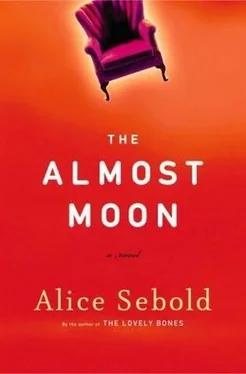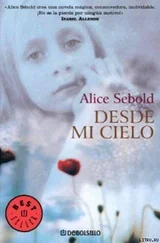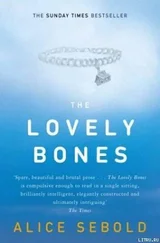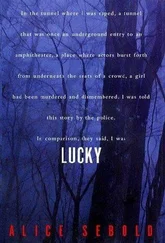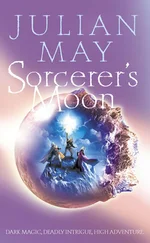“Good, Helen,” Mr. Forrest said. “That would be grain. The plates tell the story of the harvest, which was very common, but they also tell this other story. There, now, we have them in order. Come follow the plates with me.”
Mr. Forrest circled around the other side of the table and joined me at A.
“This is the figure to watch,” he said, pointing at a male figure who had what looked like a bowl cut. “See how he’s dressed in blue and gold?”
“Yes.”
“He will be in almost all the letters. This was very unusual. These alphabets are largely decorative, and to draw too much attention to any repeating figure was not done.”
“Here he is again,” I said, pointing to the C.
We walked slowly down the length of the table together. I studied each letter and followed the blue-and-gold figure.
“I take it your father isn’t home?”
“He’s supposed to be in Erie.”
“How is he these days?”
“If I could get my driver’s license, I could at least do the grocery shopping.”
I reached the X and leaned in close. On the slant that began on the left, there was a figure who could have been sleeping. On the slant that began farther right and crossed over the body of the sleeping figure was the blue-and-gold figure. He held only the handle of the lance. The rest was buried in the sleeping figure.
“He murdered someone!” I said.
“Bravo, Helen! Very good! It took me much longer to see.”
The Y was the murderer imploring the Gods, his arms raised up and his head visible only from the pitched-back chin as he screamed. And the Z had no human figures in it at all, only a series of lances interconnected over and over again, and at the very end, an anvil.
“You make money this way?”
“Yes. I travel to different antiquarian book fairs, and I try and find things at estate sales. I always take a pair of gloves along. I’ve plundered just about every nook and cranny within a hundred miles.”
“How much is this worth?”
“Do I see a burgeoning collector before me?”
He began to gather up the letters, starting with the Z and moving up toward the middle of the alphabet, where the box sat. He placed the latter half of the alphabet inside and then continued from the M up to the A.
“All I’ve got at this point are pictures of my mother in slips.”
“Do you know what a muse is, Helen?”
“I guess.”
“What?”
“Poets have them.”
He placed the stacked letters inside the cardboard box and put the lid on it. “Other artists do too.” He walked over to the shelves along the back wall and went immediately to a large white-spined book. He turned and brought it over to me, delivering the hefty volume into my hands.
“The Female Nude,” I read.
Mr. Forrest pulled out a round-backed wooden chair. “Here, sit. Many artists have muses. Painters, photographers, writers. There is something very muselike about your mother.”
I sat at the shiny wooden table and looked at page after page of nude women. Some lay on couches and some sat on chairs, some smiled demurely and others had no heads at all, just legs, breasts, and arms.
“My father works with sediment.”
“That doesn’t mean Clair can’t inspire him.”
“In what?”
“She keeps him going, Helen. If you can’t see that, you’re blind. They are interlocked-each sustains the other.”
On the pages in front of me were two paintings of the same woman. “The Clothed Maja,” I read aloud. “The Nude Maja.”
“Yes. Goya,” Mr. Forrest said. “Aren’t they wonderful?”
I looked at the two paintings side by side, then hurriedly closed the volume.
“Mr. Warner said everyone thinks we should move,” I said. I saw the holes in the wood of the table now, where iron must have been driven through to secure the bridge’s beams. They were filled with perfectly cut pegs made from a wood that was lighter in color.
“Do you want to move?”
“I don’t know.”
He was quiet for a moment, and then he offered me his hand.
“I think you should allow me to help you learn how to drive.”
“In the Jag?”
“Are there other cars? I wasn’t aware.”
I flushed with happiness.
On my way home, I carried two things: the picture of my mother in her ecru slip, which I would replace, and an open invitation to come play with Tosh. But what preoccupied me most were visions of myself at the wheel of Mr. Forrest’s car. I would wear a colorful scarf around my head and huge sunglasses, and, somehow, I would smoke.
It was dark out now, but there were no lights on downstairs at our house. Inside, I saw that the bathroom off the kitchen was empty and that the radio had been left, along with my mother’s knitting, at the base of the stairs. I went up to my bedroom and took a pair of pajamas from the bottom dresser drawer.
I changed and went down the hall to brush my teeth. I thought of the nudes hidden in Mr. Forrest’s house. He had forgotten to give me a book to take to my mother, and somehow this delighted me, as if I’d won a competition, as if his loyalty, however obliquely, had been transferred to me. In the bathroom I filled my pink plastic glass with water and brought it back to my room.
I could hear the snap of the metal blinds as I entered my bedroom.
“Where did you waltz off to?” my mother asked. She walked to the second window, directly over my bed, and snapped shut the blinds.
I did not respond. Instead I walked past her and sat down in an old chair I kept in the corner of my room. It was piled with half-dirty clothes, as it always was, but instead of moving them, I sat high on my mountain and looked over at her.
“Really, I was worried sick,” she said.
I said nothing.
My mother began pacing back and forth on the braided rug.
“Look, Helen, you know it’s hard for me,” she said.
Nothing.
“There was no way I could face those men. I haven’t even been out in the yard since, well, you know, since that boy fell in the road.”
He was hit by a car! I screamed it, but only inside my head.
“Where were you?”
She looked at me, half accusing and half pleading. Her hands were shaking and reaching out about her to soothe some beast I couldn’t see, some phantom self that haunted her day by day. Mr. Forrest’s words were the only ones I heard: “mentally ill.”
“I suppose you went to Natalie’s. Don’t think I can’t smell booze when it passes by me. What did you tell that woman? Did you tell her your crazy mother was cowering in the bathroom? You won’t get very far bad-mouthing me to the neighbors, getting drunk with Natalie and her bilious mother. I can’t keep this house in order without help. Do you know where Natalie’s mother comes from? Do you? The South, just like me, but she did one of those ‘I’m moving north and losing my accent’ maneuvers like the South is some sort of trash bin she’s fleeing from. Believe me, if you think your little friend Natalie’s mother is any better than me, you’re crazy.”
I saw myself as if outside my body. I rose from my chair as my mother continued speaking, though I could not hear her anymore. Her hands were waving about her ever more wildly, and all I wanted was for it all to stop. The pink plastic glass was in my hand, and then my hand was shooting forward, and only the water hitting my mother’s face woke me to what I had done.
I wanted to tell her that I’d been hit; I wanted her to comfort me. I wanted to scream at her and rake my nails down her face. I wanted her to be sane. But instead she cowered, and I screamed, “Mr. Warner informed me that it is the consensus of the neighborhood that we should move!”
Читать дальше
